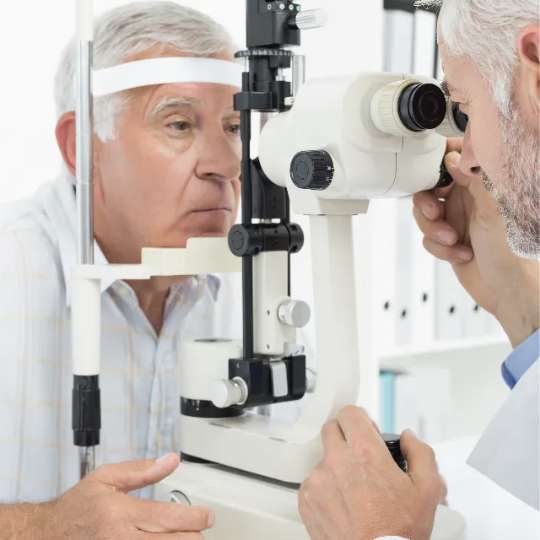Diabetes and Eye Conditions
Diabetes is a disease that affects the way we process food for energy and growth. With all forms of diabetes—type 1, type 2, and gestational diabetes—the body has trouble converting sugar in the blood into energy, resulting in a variety of potential health problems.
Around 1 person in 25 in the UK has diabetes. If you have diabetes, it’s important to monitor your eye health, because increased blood sugar levels can lead to sight-threatening vision problems such as cataracts, glaucoma, and retinopathy.
If you have diabetes, your GP or specialist clinic will arrange for you to have a retinal screening every year. It is also important if you know you have diabetes to monitor any changes to your overall health.

Diabetic Retinopathy
The retina is a group of cells on the back of your eye that take in light. They turn it into images that the optic nerve sends to your brain. High blood sugar levels can cause damage to small blood vessels in your retina, this is called diabetic retinopathy. If you keep your blood sugar under control, you lower your chances of any loss of vision due to damage to these blood vessels.
When the macula (the part of the retina responsible for your central vision) is affected by your retinopathy, you are said to have diabetic maculopathy. This means that your central vision, which is required for seeing fine detail and colour, will be blurred. This will make things like reading, writing, and seeing detail difficult.
If there is a leakage of fluid from the blood vessels near the macula, this fluid can build up and cause macular swelling. This is called diabetic macular oedema, and it can cause vision to be blurred and distorted, as well as making colours appear washed out.
Treatments offered at SpaMedica
SpaMedica offer treatment for cataracts and age-related macular degeneration, which you may be at greater risk of if you have diabetes. Several of our hospitals offer treatment for diabetic macular oedema in the form of Anti-VEGF (vascular endothelial growth factor) injections:
Anti-VEGF Injections
Anti-VEGF injections are used to reduce swelling and prevent the growth of abnormal blood vessels in the retina. These injections help to stabilize vision and, in some cases, improve it. This might sound daunting, but you won’t feel any pain, as you’ll be given anaesthetic eye drops to numb the eye beforehand.
It can be upsetting to be diagnosed with a diabetic eye condition, and it’s normal to find yourself worrying about the future and how you will manage with a change in your vision. Most of the eye problems caused by diabetes can be treated, but it is vital that these problems are picked up as soon as possible, as treatment is more effective when given early.
This service is currently offered at: Birmingham, Carlisle, Coventry, Chelmsford, Gateshead, Newark, North Tyneside, Peterborough, Romford, Stockton-on-Tees, Solihull, West Lancashire

